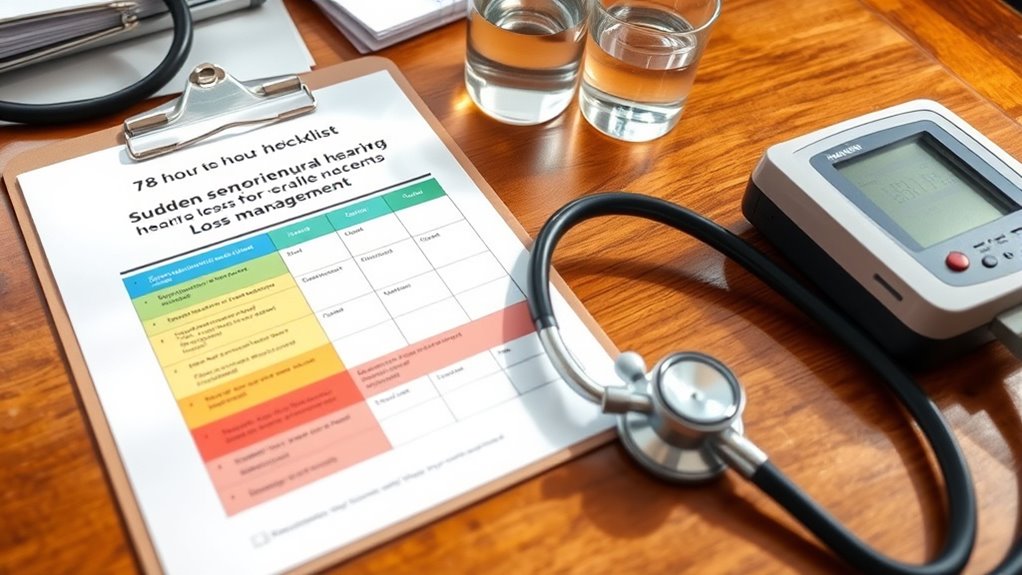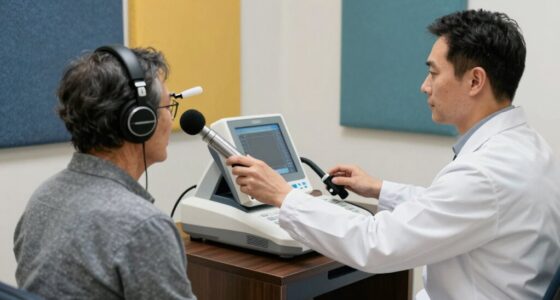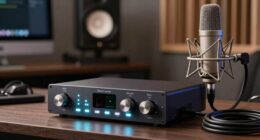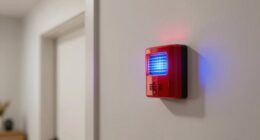If you experience sudden sensorineural hearing loss, act fast within the first 48 hours to improve your recovery chances. Seek immediate medical attention, schedule an appointment with an audiologist or ENT, and follow prescribed treatments like corticosteroids. Manage tinnitus early with sound therapy and stay in quiet, stress-free environments. Keep track of symptoms and stay in touch with your healthcare provider for ongoing guidance. To learn more, continue exploring effective strategies for managing this condition.
Key Takeaways
- Seek immediate medical evaluation within the first 48 hours for accurate diagnosis and corticosteroid treatment.
- Manage tinnitus proactively with sound therapy and relaxation techniques to reduce distress.
- Minimize exposure to loud noises and stress to support recovery during the critical initial period.
- Monitor symptoms closely and report any changes or worsening to your healthcare provider promptly.
- Seek emotional support from loved ones or support groups to maintain mental well-being during recovery.

Sudden sensorineural hearing loss (SSNHL) demands prompt action because early intervention can markedly improve your chances of recovery. The moment you notice a sudden change in your hearing, it’s essential to act quickly by seeking medical attention. Time is of the essence, and delaying treatment could reduce the likelihood of restoring your hearing fully. During these first 48 hours, your focus should be on both medical steps and emotional well-being. Managing tinnitus, which often accompanies SSNHL, becomes a priority, as it can be distressing and impact your mental state. Techniques like sound therapy, white noise machines, or relaxation exercises can help mitigate the annoyance and keep you calm. Remember, addressing tinnitus early can prevent it from worsening and help you maintain a more positive outlook.
Act quickly with medical care and manage tinnitus early to improve your hearing recovery and emotional well-being.
Equally important is providing yourself with emotional support. Facing sudden hearing loss can trigger feelings of anxiety, frustration, or isolation. Reach out to loved ones, friends, or support groups who understand what you’re going through. Talking about your fears and concerns can lessen the emotional burden and help you stay resilient. If you find yourself overwhelmed, consider seeking counseling or mental health support to navigate these feelings. Your emotional health plays a key role in your overall recovery, so don’t dismiss it.
In these vital first hours, you should also prioritize making an appointment with an audiologist or ENT specialist. They can perform the necessary tests to confirm SSNHL and recommend appropriate treatment, often involving corticosteroids to reduce inner ear inflammation. Follow your healthcare provider’s instructions carefully, as adhering to prescribed treatments enhances your chances of regaining hearing. Keep track of any changes in your symptoms, including the severity of tinnitus or the presence of dizziness, and report these during your follow-up visits. Additionally, understanding the importance of certain factors like high-quality sound therapy can support your tinnitus management during recovery.
While awaiting medical intervention, avoid loud environments and minimize stress, which can exacerbate your symptoms or make tinnitus more bothersome. Stay in a calm, quiet space, and practice mindfulness or deep-breathing exercises to help manage anxiety. Remember, the first 48 hours are critical; staying proactive about your health, managing tinnitus effectively, and seeking emotional support can markedly influence your recovery trajectory. Your swift response now sets the foundation for the best possible outcome.
Frequently Asked Questions
Can Lifestyle Changes Prevent Sudden Sensorineural Hearing Loss?
You might wonder if lifestyle changes can prevent sudden sensorineural hearing loss. While not guaranteed, managing stress and making dietary adjustments can support your ear health. Reducing stress helps prevent strain on your body, and eating a balanced diet rich in vitamins and minerals can strengthen your immune system. These steps may lower your risk, but it is crucial to stay alert for symptoms and consult a doctor promptly if issues arise.
Are There Natural Remedies to Complement Medical Treatment?
They say “an ounce of prevention is worth a pound of cure,” and natural remedies might offer some support. While herbal supplements and dietary adjustments can’t replace medical treatment, they could potentially enhance recovery. You might consider adding supplements like ginkgo biloba or omega-3s, and eating a balanced diet rich in antioxidants. Always check with your healthcare provider before starting any natural remedies to guarantee they’re safe for you.
How Does Age Affect Recovery Prospects?
Age impacts your recovery prospects because age-related hearing decline can make healing more challenging. Elderly recovery factors include reduced nerve regeneration and overall health, which may slow or limit improvement. You might find that younger individuals respond better to treatment, but don’t lose hope. Early intervention remains vital, as addressing sudden sensorineural hearing loss promptly can improve your chances of regaining hearing, regardless of age.
What Are the Long-Term Effects of Untreated Hearing Loss?
Untreated hearing loss is like a silent mountain that keeps growing, making communication harder over time. If you don’t seek hearing aid options or auditory rehabilitation, you risk social isolation, depression, and cognitive decline. Long-term, your brain struggles to process sounds, and speech understanding worsens. Addressing hearing loss early keeps your mind sharp and helps you stay connected, turning down the volume on life’s valuable moments.
When Should I Seek Emergency Care for Sudden Hearing Loss?
If you experience sudden hearing loss with emergency symptoms like dizziness, ringing, or pain, seek emergency care immediately. Don’t delay, as quick action can preserve your hearing. Your immediate actions should include staying calm, avoiding loud noises, and getting to a healthcare facility promptly. Early treatment is vital to prevent long-term damage, so don’t hesitate to seek emergency care when symptoms suddenly appear or worsen.
Conclusion
Act quickly to preserve your hearing, because delays can mean permanent loss. Follow the 48-hour checklist to guarantee prompt treatment, because every minute counts. While you may feel overwhelmed, remember that timely action offers hope and recovery. Don’t let uncertainty silence your future—trust the process, act fast, and take control of your hearing health today. In the race against time, your swift response makes all the difference between silence and sound.










